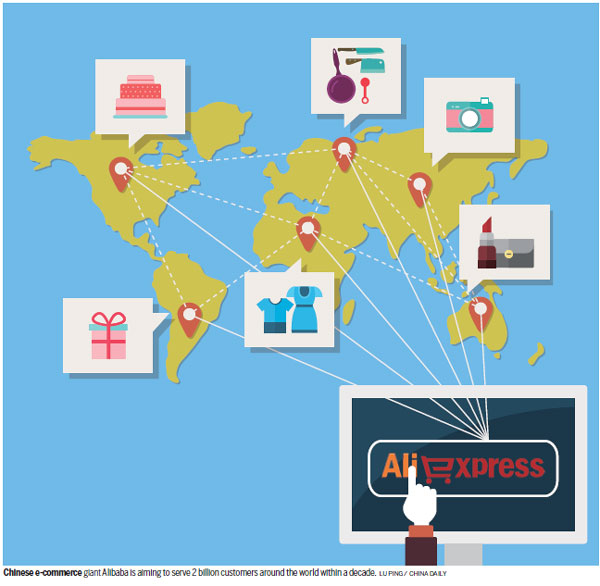Reaching out to the world
 |
|
More foreigners are starting to shop on AliExpress platform as Alibaba’s footprint expands to more than 220 countries and regions. PROVIDED TO CHINA DAILY |
Chinese e-commerce giant Alibaba is banking on its subsidiary AliExpress, a shopping platform targeted at foreigners only, to boost its profile in the global arena
Following a decade of explosive growth, China's online retail market is finally expected to experience a slowdown, with market research firm Mintel projecting that compound annual growth rate from 2016 to 2021 will dip to 15 percent.
E-commerce players will inherently have to find new streams of income in order to stay competitive. China's Alibaba Group Holding, which last year overtook US company Walmart to become the largest retail platform in the world, has been placing some of its chips on global expansion.
The Chinese online emporium, which operates Taobao and Tmall, has set a target of serving 2 billion customers around the world within a decade.
Alibaba has in recent years been aggressively expanding its footprint in foreign countries through its subsidiary AliExpress.com, an online marketplace that is exclusive to overseas customers. Founded in 2010, AliExpress has attracted more than 100 million international buyers as of April, said Dai Shan, president of Alibaba's business-to-business unit.
According to the company, customers from more than 220 countries and regions have placed orders on the platform.
One customer is Belgium housewife Carine Danblier, who claims she frequently shops for electronic gadgets and cooking accessories on the online marketplace. Danblier has even created a Facebook page where she shares the latest AliExpress deals. The followers of the site grew to 100,000 in just two years.
The top three countries by total spending on the site are Russia, the United States and Spain.
AliExpress has been the biggest shopping site in Russia since 2014, according to researcher TNS. To attract users, the platform facilitated the ease of transaction by partnering with local payment providers.
AliExpress general manager Shen Difan noted that localization is a key focus in the Russian market, saying: "We will be opening up to more local vendors, shipping from local warehouses and providing local after-sales services, including a no-excuse return policy within 72 hours."
Backed by big data technologies, AliExpress has been reshaping the logistics landscape in Russia. E-commerce customers used to have to wait for weeks and sometimes even up to two months to receive their parcels. AliExpress has cut that down to just four days.
The company is now aiming to reduce delivery time worldwide to 72 hours within the next five years by leveraging leading algorithm and real-time analysis provided by Cainiao Network Technology Co Ltd, Alibaba's smart logistics network. Customers will also be able to track their orders.
According to Cainiao President Wan Lin, his company has teamed up with various postal services to ensure faster customs clearance, including a partnership with US Postal Service, Brazilian Post, a stake purchase in Singapore Post and an e-commerce tie-up with Australian Post.

AliExpress has also become an intrinsic part of life for many women in Spain.
"The wedding is perhaps the most important occasion for women in the country," said Zuniga Perez Pell, an employee of AliExpress in Spain. "In the past, Spanish women never chose wedding dresses online. Now, it has become a ritual to browse AliExpress first before deciding on where to get a dress."
Alfonso Noriega Gomez, economic and commercial counselor of the Consulate General of Spain in Shanghai, pointed out that e-commerce is a key driver in promoting trade and economic relations and a major gateway to discover products around the world.
"Through Tmall and Tmall Global, Chinese consumers are able to enjoy products from Spain. We hope AliExpress can bring to life the virtual Silk Road by connecting Chinese merchandise with foreign countries including Spain," he said during an AliExpress conference in Hangzhou, Zhejiang province, in April.
Alibaba's global expansion will likely be a win-win scenario for both global shoppers and export-driven Chinese manufacturers who are transitioning from being original equipment manufacturers to providers of more premium products.
NewVision Arts, a Chinese curtain maker in Wenzhou, Zhejiang province, is one of the Chinese companies that have benefited from the growing global presence of AliExpress. According to its general manager Cheng Shouxin, the company receives a steady stream of orders from US clients for tailor-made curtains and can earn up to $850,000 in revenue a month.
Alibaba has also sought to gain a larger share of the global e-commerce pie through acquisitions. In 2016, Alibaba acquired Singapore online grocery platform Red Mart. Technology news site TechCrunch quoted sources saying the deal was worth up to $40 million.
That same year, the Chinese e-commerce giant also bought a controlling stake in Lazada, one of Southeast Asia's largest online shopping platforms, for $1 billion. This June, Alibaba invested another $1 billion to raise its stakes to 83 percent, buying out all other backers with the exception of Singapore's Temasek Holdings.
Lazada has a footprint in several markets in the region, including the Philippines, Malaysia, Singapore, Indonesia and Thailand. Alibaba said in a recent report that Lazada had about 23 million active customers in the 12 months through the end of March 2017.
Alibaba is also in the midst of building an e-commerce and logistics hub in Thailand that will provide a one-stop service connecting SMEs, manufacturers, service providers and logistic partners. In addition, Ant Financial, Alibaba's digital financial services arm that operates Alipay, bought a stake in Thai fintech company Ascend Money in 2016.
hewei@chinadaily.com.cn
















